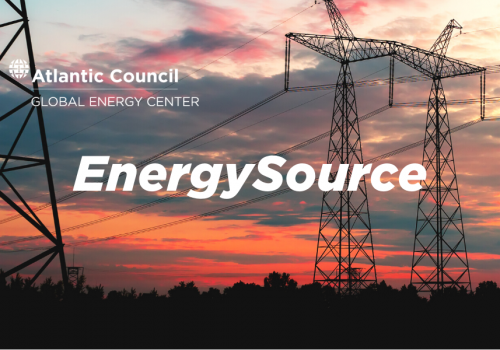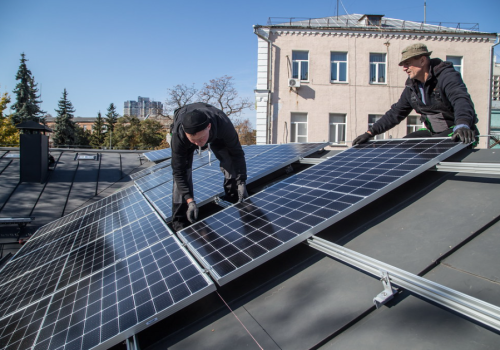Two years on, what the Russian invasion of Ukraine means for energy security and net-zero emissions
Russia’s full-scale invasion of Ukraine on February 24, 2022 has reverberated throughout the global energy landscape, significantly impacting both energy security and the ongoing transition towards sustainable energy sources. Swift action is needed to mitigate risks, strengthen resilience, and ensure that energy remains a driver of stability and prosperity in the face of geopolitical uncertainty. Our experts share their insights on the second anniversary of the war.
Click to jump to an expert analysis:
Charles Hendry: Russia’s invasion of Ukraine forced the West to confront lessons unlearned
Ellen Wald: US LNG helped keep Europe’s lights on—future resilience isn’t guaranteed
Olga Khakova: Delays in aid to Ukraine could erase energy security wins from the last two years
Robert F. Ichord: Europe reduced Russian energy—but created a solar energy paradox
Joseph Webster: War dims Gazprom’s future as China doubles down on homegrown energy
STAY CONNECTED
Sign up for PowerPlay, the Atlantic Council’s bimonthly newsletter keeping you up to date on all facets of the energy transition.
Russia’s invasion of Ukraine forced the West to confront lessons unlearned
There’s a Winston Churchill quote for every occasion and as he (supposedly) said about energy: “Security comes from diversity and diversity alone.” That’s as true today as it was more than one hundred years ago. The harsh lesson from Russia’s illegal invasion of Ukraine was that Europe had allowed itself to be overly reliant on a single source of gas supply. The actions by European governments since then—and especially Germany—to end that reliance have been extraordinary, but the clear lesson is that we must never again allow such dependence.
The move in the last two years to bolster energy security had led to greater focus on indigenous sources of power and an accelerated commitment to low-carbon sources of generation. And for once, the answer to the questions of what is best for security, for climate, and for affordability is mostly the same —go low carbon. Our governments are rightly focused on how we can enhance our energy resilience, yet still meet our net-zero commitments.
In the longer term, we can also see where the next threat of over-dependence comes from. It is not healthy for the West to be so dependent on China for so much of the low-carbon supply chain—for example, around 90 percent of the lithium chemicals we need for electric vehicles comes from China. Such overreliance is not good for China either, so we need to act now to build up our own industries, to make sure that we have supply chain security. The United States is leading the way on this through the Inflation Reduction Act, and it is now for the EU and UK to respond accordingly.
–Charles Hendry is a distinguished fellow with the Atlantic Council Global Energy Center, a former member of the UK Parliament, and former UK minister of state for energy.
US LNG helped keep Europe’s lights on—future resilience isn’t guaranteed
The real story behind European energy security post-Russian invasion of Ukraine is the incredible growth of the US LNG industry. According to the US Energy Information Administration (EIA), the United States exported more liquefied natural gas (LNG) than any other country in the first half of 2023. US LNG exports to European countries in the first six months of 2023 more than doubled compared to pre-war exports in 2021. Without this incredible expansion, both in US LNG exports and in regasification terminals in Europe, the continent would not have been able to reduce Russian natural gas and oil, and maintain electricity and fuel supplies as it did.
The US energy industry’s role in ensuring European energy security cannot be stressed enough—no other LNG exporting country in the world was in the position to expand its exports as rapidly as the United States was when the Nord Stream pipeline was destroyed and sanctions against Russian energy were put into place. For this, among other reasons, the Biden administration’s decision to suspend authorizations for new LNG export terminals must be questioned. If the EU and the US do not foresee an end to the Russia-Ukraine war in the near future, how can Europe continue to secure sufficient natural gas to meet growing energy demands without more LNG from the United States?
Although sanctions against Russian crude oil and petroleum products caused temporary disruptions on the global oil trade, the market has responded in resourceful ways. Without European countries to purchase their crude oil, Russia expanded sales to China and opened a new market in India. According to data provided by TankerTrackers.com, India has become the second largest importer of Russian crude oil and the largest importer of Russian seaborne crude oil. In 2023, India imported an average of 1.7 million bpd of Russian crude oil, whereas prior to the invasion of Ukraine it imported next to none. Countries like India and Turkey have found new business opportunities importing Russia crude oil and refining it into petroleum products that European customers are eager to purchase. Russia has also developed its own shipping fleet and insurance network to work around the US-EU price cap policy that is designed to limit their oil revenue.
Two years later, it can be concluded that the energy sanctions and price cap policies are not hurting Russian revenue significantly enough to impact its ability to wage war in Ukraine. As US policymakers consider whether to continue aiding Ukraine, the efficacy of these sanctions and price cap policies should also be examined. At the same time, the resiliency of the global energy oil market to accommodate such major changes without incurring serious shortages should be applauded.
–Ellen R. Wald is a nonresident senior fellow at the Atlantic Council Global Energy Center and the president of Transversal Consulting.
Delays in aid to Ukraine could erase energy security wins from the last two years
For two years, Russia has carried out indiscriminate, exceptionally cruel attacks on Ukraine’s civilian energy infrastructure. Included in these attacks have been acts of ecocide, such as the destruction of the Kakhovka Dam. However, Ukraine’s energy system and the sector workforce have showcased unparallel resilience and innovation in withstanding Moscow’s aggression, with robust technical, financial, and capacity support from the allies.
Beyond Ukraine, the war also profoundly and rapidly reshaped energy throughout Europe. Europeans have optimized homegrown production and efficiency measures to reduce reliance on imports, built out additional interconnectors to secure alternative energy supplies, and spent billions to minimize economic hardships on businesses and households.
As the war drags on, the West must learn to see Ukraine not as a charity case—but as a symbiotic energy partner contributing to European energy security and decarbonization. Ukraine offers important lessons in repelling cyber security attacks, fixing destroyed energy infrastructure, operating energy markets under volatile conditions. It also has valuable expertise in oil and gas, renewables, and civil nuclear energy. Ukraine has integrated into the European electricity market in record time, houses a critical gas storage system that is currently utilized by European gas traders, and is taking bold steps on reform and regulatory changes necessary for EU integration. However, these advantages are at high risk. War and political uncertainties are keeping new large-scale investments away; human capital shortages are placing additional strains across all levels of Ukrainian systems; and the delay in aid from the United States is impacting the recovery and defense of Ukraine’s energy generation. Western support is needed more urgently now than ever to ensure that Ukrainians can continue defending European territories, democratic values, and energy security.
–Olga Khakova is the deputy director for European energy security at the Atlantic Council’s Global Energy Center.
Europe reduced Russian energy—but created a solar energy paradox
The war in Ukraine has spurred profound changes in Europe’s energy system and fostered concerted efforts like REPowerEU to improve energy security. Not only has it reoriented and reduced dramatically Europe’s gas supplies from Russia and cut gas consumption, but it has boosted Green Deal transition efforts to develop renewable and zero-carbon energy (including nuclear) and improve energy efficiency. It has motivated the forging of stronger energy links both among European countries and with the United States, which supplied about 50 percent of the EU’s LNG imports in 2023.
But in doing so, these overall efforts have created a paradox. The rapid growth in solar energy that is reported to be 40 per cent higher in 2023 than the 41 GW of solar added in 2022, has made the EU dependent on China for over 95 percent of its solar photovoltaic (PV) modules and threatens domestic EU manufacturers due to the much lower price of Chinese modules. Renewables constituted 23 percent of the EU primary energy consumption in 2022, of which solar was about 6 percent and was the fastest growing share providing 12 percent of EU electricity in the summer months. The EU Council has raised the binding target to 42.5 percent in 2030 with the ambition to achieve 45 percent. The EU Solar Strategy aims to increase solar PV capacity to 320 GW by 2025 and up to 600 GW by 2030, compared with 260 GW in 2023.
The EU and its member governments are debating various options to increase domestic solar PV production and limit imports from China. There is some consensus on setting a 40 percent non-binding self-sufficiency target but there are divergent interests between the domestic manufacturing companies and installers and assemblers of systems. Faced with a similar situation, the US placed high tariffs on Chinese modules, diversified suppliers and temporarily waived tariffs on imports from Southeast Asia and provided credits for solar PV manufacturing under the Inflation Reduction Act. Such an approach by Europe would be expensive for Europeans, who are already experiencing high costs of energy. In his February 12 speech to the European Parliament, EU Council President Charles Michel stressed the importance of energy affordability in efforts to improve EU energy security, noting that EU energy prices were 4.5 higher than its main competitors.
But there is a path for reducing dependence on China’s solar supply chain. The market is currently flooded with solar PV panels as Chinese manufacturers overproduced in 2023 and European companies imported more than they installed. Stockpiling panels, for example, could be part of a less expensive strategy for reducing vulnerability to market manipulation or politically inspired supply cutoffs. Although the energy security implications from this growing dependence on Chinese solar panels are quite different from Russia’s use of gas as a political weapon against Europe, current overall geopolitical and trade tensions with China suggest that China’s global market monopolization of this important energy technology requires serious consideration and coordination among Western allies.
–Robert F. Ichord, Jr., is a nonresident senior fellow with the Atlantic Council Global Energy Center.
War dims Gazprom’s future as China doubles down on homegrown energy
Russian gas giant Gazprom will never recover from Putin’s invasion of Ukraine. Gazprom’s exports to Europe stood at just 28 billion cubic meters (bcm) in 2023, down from 200 bcm in 2019, before the invasion and COVID. The Russian pipeline export monopolist is exceedingly unlikely to offset this loss of demand via other markets, including China, as its long-planned Russia-to-China Power of Siberia-2 pipeline has gained little traction since the invasion despite Gazprom’s desperation to clinch a deal. The reasons for the delay are manifold and include high interest rates, financing disagreements, elevated steel costs, and geographic realities.
Perhaps more importantly, Putin’s invasion and the resulting shock to global energy prices reinforced Beijing’s energy security anxieties. China is constructing massive amounts of renewables while also doubling down on coal plant construction (although throughput across its coal fleet will likely decline in future years). China added nearly 300 gigawatts of wind and solar capacity in 2023 and could very well replicate that pace—or even accelerate it—for another decade. Chinese deployment of clean electricity generators, paired with batteries, heat pumps, hydrogen (eventually)—and, incongruously, coal—is sharply reducing its need for Russian natural gas. In sum, while Putin may yet prevail in Ukraine, Gazprom’s exports will almost certainly never approach pre-war volumes.
–Joseph Webster is a senior fellow at the Atlantic Council’s Global Energy Center and editor of the China-Russia Report. This article represents his own personal opinion.
Nuclear power remains a crucial pillar of global energy security and decarbonization
From the earliest days of Russia’s brutal invasion of Ukraine in February 2022, nuclear energy has been a flashpoint in the war. Russia shelled and subsequently occupied the Zaporizhzhia Nuclear Power Plant, and a key part of the response from the US government and non-governmental organizations has focused on efforts to provide relief to Ukrainian nuclear power plant workers.
Even while under attack, Ukraine has recognized that the nuclear energy sector is a crucial part of its power sector, its ability to rebuild its industrial sector, and its long-term economic prosperity. Even with the loss of the Zaporizhzhia Nuclear Power Plant, roughly “55 percent of all electricity production in Ukraine is still from [nuclear reactor] units at Khmelnytskyi, Mykolaiv and Rivne.” Furthermore, Ukraine has ended imports of nuclear fuel from Russia and has relied on US-based Westinghouse Electric Company for its nuclear fuel needs. With an eye toward eventual reconstruction in Ukraine, US Special Presidential Envoy for Climate John Kerry and Ukraine’s Minister of Energy German Galushchenko announced in November 2022 “a two-to-three-year pilot project aimed at demonstrating the commercial-scale production of clean hydrogen and ammonia from small modular reactors in Ukraine using solid oxide electrolysis.”
Ukraine’s regional partners—especially Poland and Romania, which are deeply involved in Ukraine’s energy future—also understand the extent to which the nuclear energy industry must play a crucial role in Ukraine’s reconstruction. Romania is currently the only country in Central and Eastern Europe that is operating North American reactors, with its Canadian CANDU reactors having generated electricity since 1996. Romania also plans to build a first-of-a-kind small modular reactor, in partnership with the United States. Poland is dedicated to establishing a civil nuclear program, with plans for large lightwater reactors and small modular reactors.
Finally, Russia’s unprovoked war in Ukraine has had a major impact on the global nuclear energy industry. Problems that may have been papered over prior to February 2022 have been brought to the fore. For example, US and global dependence on Russian enrichment and conversion capabilities for nuclear fuel is finally being addressed as the US has started ramping up domestic capacity for enrichment and conversion. However, more remains to be done. As Russia continues to make inroads into emerging markets for nuclear energy technologies, the United States and its allies must redouble their efforts to outcompete Russia, in order to ensure that new-to-nuclear countries are able to uphold the highest standards of safety, security, and nonproliferation.
–Jennifer T. Gordon is director of the Atlantic Council Global Energy Center’s Nuclear Energy Policy Initiative.
Related content
Learn more about the Global Energy Center

The Global Energy Center develops and promotes pragmatic and nonpartisan policy solutions designed to advance global energy security, enhance economic opportunity, and accelerate pathways to net-zero emissions.



